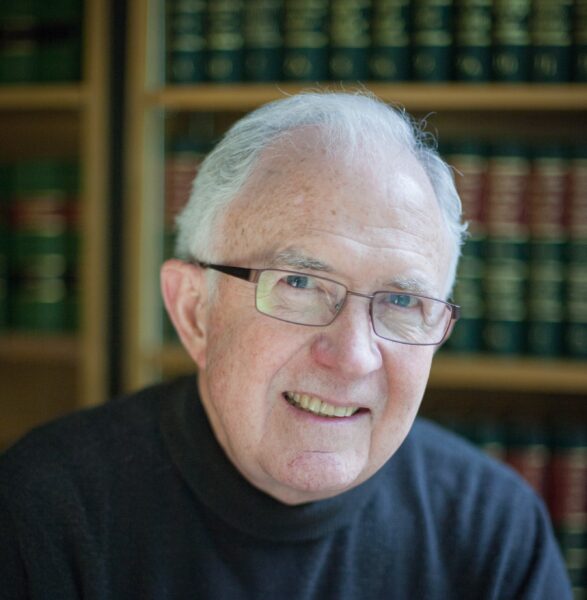I write this article in memory of my older and only brother, Potter Woodbery who tragically died in 2008 from the aftereffects of his then existing type 1 diabetic condition brought on by a medical treatment attempt to treat his long-standing mental depression with electroshock therapy. The day after the treatment his pancreas permanently produced no more insulin. Early in his life he had committed to become a Christian Pastor and after graduating from college, attended and graduated from Union Theological Seminary in New York, but about then, he somehow lost his faith in God and even abandoned his belief in God as our creator.

My brother was a highly intelligent man ultimately holding a PhD in English literature in 1969 from Emory University in Atlanta, Georgia. Thereafter he had a career as a college professor with his final position at Baylor University in Texas and as explained above, until his depression and the failed attempt using electro shock therapy, ended his job there. That vocation, except for a move back to Florida and some work at a local community college, was effectively over for him.
Potter and I had been raised as Christians in the small town of Havana, Florida in the local Methodist church. Our great-great grandfather, Collins Woodbery, a Methodist pastor in South Carolina had moved his family to north Florida in around 1840 and established the first Methodist Church in north Florida in the small community of Hinson, Florida. In 2003, Potter had a diabetic stroke and was in a coma for 5-7 days before a daughter found him. He recovered but after that, he had no more short-term memory until his death in 2008. Before this tragic event, He and I by email exchanges (by then I was in Washington state and he resided in north Florida) had debated the question of our now different beliefs.
I have thought long and hard as to how someone with the upbringings, educations and backgrounds that my brother Potter and I had, could decide to permanently enter and hold this mental state of unbelief. The following thoughts are from my own exploration of what a highly intelligent man with an extensive education like my brother had must have considered along the path of life and thinking to reach the conclusion that he did and its consequences. As I will explain at the end, I now firmly believe that my brother Potter before he had that mind changing stroke finally reached a different and from my point of view, the right decision.
Many accept that if you do not believe that Jesus Christ was and is the Son of God and that he died on that cruel cross to pay for your sins including unbelief that you will descend into Hell. The traditional image of Hell is that of torture, fear, terror or some other form of terrible punishment. Many have questioned the “justice” of God if anyone who refuses to believe in the promise of eternal life with God should be permitted to suffer so.
Jesus spoke from time to time in metaphors and occasionally employed hyperbole in describing the difficult to describe spiritual phenomena of how a material body after death that has rotted to dust on earth, could experience the physical sensation of a fiery hell but whatever the process or condition, Jesus warns against that most undesirable condition to be experienced forever, no matter how difficult it would be to describe the actual process 2000 plus years ago or even today. For example, he referred to “Gehenna” as a metaphor for Hell because a trash dump in old Jerusalem where refuge continually burned and where children had been sacrificed to the pagan god Moloch, but he did in Matthew 18:9 say they would be “thrown into the fiery hell” and in Mark 9:43 also said, they would “go into hell into the unquenchable fire” and even quoted Isaiah in 66:24 “that their fire would not go out”.
Another possibility for the unbeliever exists, and keep in mind we are to some extent in the realm of speculation here. Except possibly from the reports of the so called “near death experiencers” none of us, believer or unbeliever, have experienced those actual conditions either way. Regardless, the warnings by Jesus should be convincing although many, including my brother until the very end of his rational life, feel justified in their unbelief. If there is eternity for every soul with the material body in the present form gone and God who is the only source of goodness has been excluded by nonbelief, then what is there for this person to face? The source of nonbelief is the failure to surrender the will to a power beyond the soul. For the unbeliever, he either rejects goodness and pursues evil while alive and assumes there is nothing after death so that the trade he made was the one he wanted and gladly accepted, or he latches on to some explanation for life after death that allows him to hang on to his will or the right to decide.
George MacDonald, a Scottish author, poet and Christian Congregational minister, envisioned Hell as a dark, sound free existence (analogous to a baby in a womb) in which not a hint, not a shadow of anything outside your consciousness reaches you. However, every analogy breaks down for babies in the womb may very well sense the outside world to some extent. But for those of us after birth and later death, in George MacDonald’s opinion, your conscious mind is aware of its own existence, possibly just a mental image with no physical counterpart to give it neither company nor the company of any other eternal soul. He suggested that soon will beget on your imagination a thousand shapes of woe, which you will not be able to rule, direct, or even distinguish from real presences. In other words, you get the very thing you wished for, a world without God, goodness (though goodness may very well have been desired on earth, I question whether there is any real “goodness” without God) or a respite, not even a moment from your own conscious existence bombarded by every “Godless” immoral thought you ever had which become so real that the terror of that existence which you discover will go on forever and cannot be ended by the mercy of death, eternally. Such a “torture” would far surpass the horror of fire in my opinion for in physical torture you at least have anger and blame against possibly even God or others for allowing you to have made this terrible choice as a solace, a kind of bromide if you will, however unpleasant. There are two kinds of people, C. S. Lewis wrote, those who say to God, “Thy will be done and those to whom God says, thy will be done.” In other words, every soul gets its own choice of where and how it will spend eternity. If I know anyone who has made that tragic choice to reject God and choose that eternal torment, whatever its actual form may take, I pray for them that they will wake up in time to be saved from that terrible fate or if God gives me the opportunity, to intervene in the way He directs.
The fate of the saved person on the other hand must be a full-bodied resurrected existence in the presence of God and all His goodness similar to Jesus’ resurrected body and existence or the example Christ made would mean nothing. He said, I go to prepare a place for you and take you there with me. (John 14:2) Whatever Jesus was He was not a liar. He was on the earth after His resurrection in a form that permitted Him to touch it and yet go through any aspect of it such as closed doors, space and time. Here also, the term “place” could equally be metaphorical but I prefer to treat it as something good, whatever it eventually or actually turns out to be to whatever “sense” in which I am given to exist. I predict it will be the same for us. There will be no loneliness or unfulfilled purpose there. Care not whether you will ever engage in activities or the purposes of this life for they will mean nothing then. Care only that you will be with Him, forever. What we shall be and what we shall do in that eternal existence is not yet revealed. Paul wrote: “For now we are looking in a mirror that gives a dim reflection of reality as in a riddle or an enigma, but when perfection comes we shall see in reality and face to face. Now I know imperfectly, but then I shall understand fully and clearly, even in the same manner as I have been fully and clearly known by God” (1 Corinthians 13:12 Amp).
I, for one, look forward to whatever He has for me.
Now in light of all this thinking about the choices my brother had to make during his troubled life and recalling where he was in his thinking before that terrible diabetic stroke in 2003 took away his ability to any longer rationally consider these issues, consider the following report. In our email exchanges —more like a debate— he and I were having about the truth of God’s plan as stated in the Bible, his latest communication to me was encouraging in my concern for his salvation. He wrote me that I might think the hounds of heaven were nipping at his heels, for he told me he was attending an Episcopal Church in Tallahassee partly to give some order to his life and partly to remind him of his love of England. His scholarly work had involved almost exclusively English literature and he had made some trips there. He also reported that he had joined the orchestra at the Killearn Methodist Church in Tallahassee, Florida where my wife and I had attended when we lived there for a time. I didn’t get to hear the words I longed to hear. Nevertheless, my brother-in-law who lived in Tallahassee reported that just before Potter had his diabetic stroke, he had visited Potter and said he had never seen him so alive, elevated and at peace with himself. I was given the privilege to give the eulogy for my brother’s burial in the cemetery alongside where his wife and our Mother and Father are buried. I became convinced in my own mind that Potter found out the truth near the conscious end of his life and now resides in Heaven where Jesus promised all believers will exist eternally.
At his services, among other comments, I presented a revision I had made to that famous poem by Dylan Thomas, “Do Not Go Gentle Into That Good Night”, which urges us to rage against the dying of the light of life. I do not think that is sound advice nor was it expressed by the last time my brother had control over his thoughts and actions. As follows it a much better rendition and better suited for the attitudes of Christians near the end of our lives.

IF YOU GO GENTLE INTO THAT GOOD NIGHT
If you go gentle into that good night,
Old age should not burn and rave at close of day;
You will not rage against the dying of the light.
Though wise men at their end know light is right,
Even if their words forked no lightning, they
Will go gentle into that good night.
Good men, the last wave by, crying how bright,
Their frail deeds having danced in a green bay,
They will not rage against the dying of the light.
Wild men who caught and sang the sun in flight,
And learn, too late, they grieved it on its way,
They do not go gentle into that good night.
Brave men, near death, who see with blinding sight,
Blind eyes could blaze like meteors and be gay,
They will not rage against the dying of the light.
And you my brother, there on the proud height,
Bless me now with your sweet tears, I pray,
You went gentle into that good night;
There was no rage against the dying of the light.
I present the foregoing thoughts for encouragement and possible inspiration
John E. Woodbery

John Woodbery Author. A retired lawyer, John writes novels, short stories, poetry, commentaries on legal subjects, even a song (!). Find his suspense novels on Amazon: Hidden, Earl’s Retreat, Two Tombs Covers.
Leave a Reply